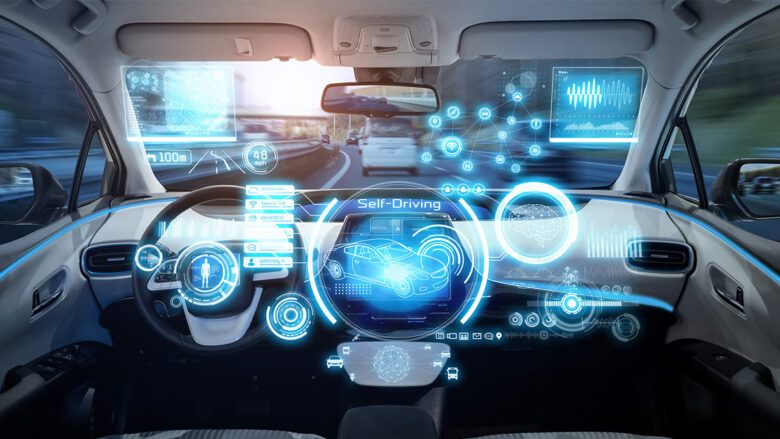Many different industries are experiencing dramatic changes due to artificial intelligence (AI) technology. The automotive industry is at the forefront of this shift. Autonomous vehicles (AVs) were once the subject of science fiction films, but thanks to advances in artificial intelligence technology, they are quickly becoming a reality. This article describes how artificial intelligence will be an important part of making self-driving cars a reality, showing how these future machines will work and what this means for society.
Learn more about self-driving cars
Self-driving cars, also known as ‘self-driving cars’, operate without human assistance. They do this by recognizing their environment and staying safe. From driver-assistance systems to vehicles that require no driver at all, automation has gone through several phases on the way to fully autonomous cars. Artificial intelligence technology is an important part of this growth because it allows vehicles to understand their environment, make choices, and learn from their mistakes.
The Impact of AI on Autonomous Vehicle Development
- Artificial intelligence sensors that can sense their environment are at the core of self-driving cars. Self-driving cars use sensors, cameras, lidar (light detection and ranging), and radar to collect information about their surroundings, such as obstacles, traffic lights, pedestrians, and other cars. Artificial intelligence algorithms process large amounts of data in real-time to create detailed maps of the area around the car.
- Artificial intelligence is of great importance when it comes to decision-making in self-driving cars. To decide the best course of action, such as when to speed up, slow down, or turn, and how to maneuver through tricky traffic situations, it examines the data sent by the car’s sensors. Machine learning models are a form of artificial intelligence that helps cars make better decisions over time by using past driving and experience data.
- AI-powered predictive models can help self-driving cars guess what hazards might be around the next bend and change the way they drive to avoid them. Self-driving cars can make roads safer and more efficient by predicting what other drivers will do and how their environment might change.
The Impact of AI on Autonomous Vehicle Development
- Improved safety One of the most important effects of artificial intelligence on self-driving cars is that it can make cars safer. AI-powered autonomous vehicles (AVs) claim to significantly reduce the number of road accidents and fatalities by eliminating human error, the leading cause of most accidents.
- Traffic management and efficiency Artificial intelligence in self-driving cars helps improve their efficiency and better manage traffic. Autonomous vehicles can communicate with each other and with transportation equipment to improve traffic flow, reduce congestion, and reduce emissions, all of which make cities more sustainable.
- Mobility and accessibility Self-driving cars can make traveling easier for people who cannot drive, such as the elderly and people with disabilities. With the help of artificial intelligence technology, vehicles can now drive safely and autonomously, making vehicles more accessible and people to travel more freely.
Challenges and Ethical Considerations
Despite the progress that has been made, there are still many problems with adding artificial intelligence to self-driving cars. Some of these are technical, such as ensuring reliability in diverse and unpredictable environments, while others are ethical, such as making decisions in dangerous situations. The future of self-driving cars will also depend on how regulations are developed and how well people accept them.
The road ahead
Artificial intelligence is a very important part of improving self-driving cars. As AI technology continues to develop, we can expect self-driving cars to get better and better, bringing us closer to a time when self-driving cars become prevalent on our roads. This change will not only impact the way we travel, but it will also change the face of cities, change the way people travel, and make transport systems safer and more efficient.
Conclusion
All in all, the combination of artificial intelligence technology and autonomous vehicles is a huge advancement in automotive development. Although there are still problems, artificial intelligence is improving, which should solve these problems and allow self-driving cars to make transportation safer, cleaner, and more accessible. The progress towards fully autonomous vehicles is a testament to how artificial intelligence can change things and lead the automotive industry to new heights.
FAQs
1. How does artificial intelligence help self-driving cars understand their environment?
AI processes input from sensors, cameras, lidar, and radar to create a real-time 3D map of the area around the self-driving car. Artificial intelligence algorithms use this information to determine what objects are, how they move, and road conditions so cars can drive safely.
2. Can the artificial intelligence in self-driving cars make decisions like humans?
Artificial intelligence (AI) in self-driving cars is designed to make decisions in a way that humans do, especially when dealing with the road and responding to changes in the environment. This is of course done using algorithms and predictive models that continuously learn and change large amounts of driving data.
3. Why are self-driving cars that use artificial intelligence safer than other types of cars?
Some of the key safety benefits include fewer accidents caused by human error such as distracted or drunk driving, faster responses to road hazards, and better traffic flow, which can reduce the risk of accidents caused by traffic congestion.
4. How can AI help with traffic control when using self-driving cars?
Artificial intelligence helps traffic management by allowing autonomous vehicles to communicate with each other and with the transportation infrastructure. This allows them to find the best routes, reduce traffic congestion, and coordinate speeds to keep traffic flowing, making roads more efficient overall.
5. What challenges will autonomous vehicles face in unpredictable environments?
Self-driving cars must deal with challenges in unpredictable environments, such as finding directions on unmarked roads, responding to unexpected obstacles or other driver actions, and operating in bad weather that can limit sensor capabilities.
